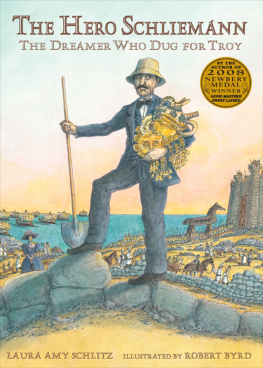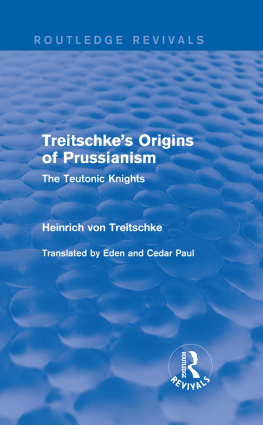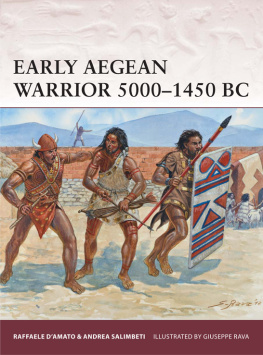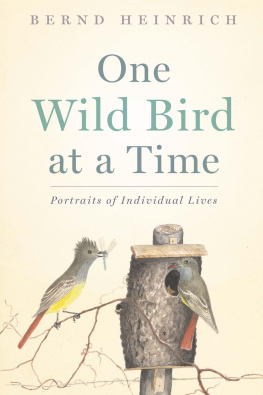

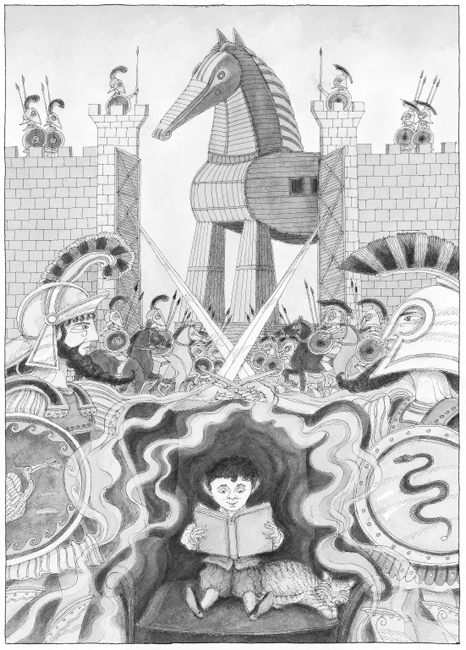
Almost two hundred years ago, in Germany, a boy scratched his initials on a linden tree.
He was small for his age, with brown eyes and a head that looked too big for the rest of him. He was fifth in a family of nine children, and the oldest living son. Two and a half months after he was born, his older brother died and he was given the dead boys name: Heinrich. The first initial, H, was two slashes and a crosspiece. He gripped the penknife tightly, trying to make the lines straight.
The next initial, S, was tricky. He knew that from experience: he had carved his initials dozens of times before, and the curves of the S were hard to control. Nevertheless, he wanted to make his mark. He started on the S of his last name.
His last name was Schliemann, and in the center of that German name is the English word lie. Perhaps now is as good a time as any to consider the subject of lying, because the boy Heinrich did not grow up to be a truthful man.
Few people are entirely honest. Many people lie once in a while. Heinrich Schliemann lied more often than that.
Heinrich Schliemann thought of his life as a story. He was the hero. He believed he was born under a lucky star, that he was meant to astonish the world with his adventures. From the time he was a boy or so he said he knew it was his destiny to dig up lost cities and find buried treasure.
And this is not impossible. It is children, after all, who dare to dream wild dreams. It is children who make up their minds that they will someday be rich and famous and that their lives will not be commonplace.
But most scholars believe that when sixty-year-old Heinrich Schliemann wrote his autobiography, he rewrote his life, giving himself the kind of childhood a hero ought to have had. Because Schliemann was an imaginative and convincing liar, its hard to know what really happened and what he made up.
He was a man who loved stories. He loved them so much that he wanted them to be true.
Heinrich Schliemann was born in 1822. His father was a clergyman, the pastor of a little village named Ankershagen. It was his childhood home, Schliemann wrote, that awakened his love for the mysterious and the marvelous. The little village of Ankershagen was riddled with stories. Close to the Schliemann parsonage, a wicked robber had buried his dead child in a golden cradle. Behind our garden, Schliemann wrote, was a pond... out of which a maiden was believed to rise each midnight, holding a silver bowl.... My faith in... these treasures was so great that, whenever I heard my father complain of his poverty, I always expressed my astonishment that he did not dig up the silver bowl or the golden cradle and so become rich.

Schliemanns story about these folk tales may be true or it may not. The legends about the golden cradle and the silver bowl are authentic Ankershagen stories; Schliemann did not make them up, and he may have known of them when he was a boy. All his life he was fascinated by what lay buried: by bones and graveyards and treasure. It is also possible that Heinrich only read the stories later in his life. There were books of Ankershagen folk tales in his library when he was a man.
According to Schliemann, his love for the poet Homer also began in childhood. At the age of seven, he received a Christmas present from his father, a childrens book based on Homers epic poem The Iliad. Inside the book was a picture of the ancient city of Ilium, or Troy. Heinrich was much struck by the towering walls of the city. Father, he insisted, if such walls once existed, they cannot possibly have been completely destroyed.
Heinrichs father tried to explain to his son that the city of Troy had been burned to the ground and that no one alive knew where the city had been. But Heinrich would not listen. It was then that he decided that he would someday search the world for the lost city of Troy and dig it out of the ground.
Is the story of the Christmas gift and what it inspired true? Who can say? The Iliad is a story of courage, violence, and splendor the kind of story that can set the imagination on fire. And a copy of the childrens book was found in Heinrichs library when he was grown up, and Heinrichs name was written inside but in the handwriting of an adult. Only one thing is certain: if seven-year-old Schliemann dreamed of finding lost Troy, his dreams were abruptly set aside. When Heinrich was nine years old, his whole world changed.
Ernst Schliemann, Heinrichs father, was a poor excuse for a man of God. He was quarrelsome and violent. He drank too much and spent large sums of money on presents for a woman who was not his wife. The people of Ankershagen suspected him of mishandling money that belonged to the church. They disapproved of him and felt sorry for his wife.
When Heinrich was nine years old, his mother died and the people of Ankershagen began to show Pastor Schliemann how they felt about him. They took to marching around the Schliemann house every Sunday, banging on pots and pans and throwing stones. The village children were no longer allowed to play with the young Schliemanns.
Heinrich felt a special grief in losing touch with a little girl who was his friend, Minna Meincke. Heinrich and Minna had vowed that one day they would marry and devote their lives to searching for treasure. In his autobiography, Heinrich wrote that no trouble in his adult life caused him as much pain as my separation from my little bride.
Little bride? When Heinrich Schliemann was writing his autobiography, tales of childhood romance were considered very touching. The tale of Minna may have been one of Heinrichs prettiest stories. He did, however, ask Minna to marry him fifteen years later.
Heinrichs ninth year was a hard one. His mother was dead, his father was disgraced, and he was sent away to live with an uncle, who arranged for his education.
In the years that followed, Heinrichs father lost his job, and the family grew poorer. It was decided that Heinrich, as the eldest son, should leave school and earn his own living. At this time, he was fourteen years old, a slight and weedy-looking boy with a hollow chest. None of Heinrichs school reports give any hint that the schoolboy was a genius. His grades were only so-so.
He spent the next five years working for a grocer named Ernst Holtz. The work was both strenuous and dull. From five in the morning to eleven at night, Heinrich unpacked heavy barrels of goods. His muscles ached, and his mind was numb with boredom. Worst of all, he felt trapped: the future held nothing but more of the same.
It was ill health that saved him. One day he lifted a heavy cask of chicory and began to cough up blood. Coughing up blood is a symptom of tuberculosis, a deadly disease that was widespread in the 1800s. Heinrich feared that unless he found less taxing work, the disease would kill him.
And so Heinrich left the grocers shop behind. A change of climate was often prescribed as a cure for tuberculosis, and Heinrich had an itch to travel, to escape to another land. He hastened to his fathers house and begged for money to take a journey. Ernst Schliemann refused.

